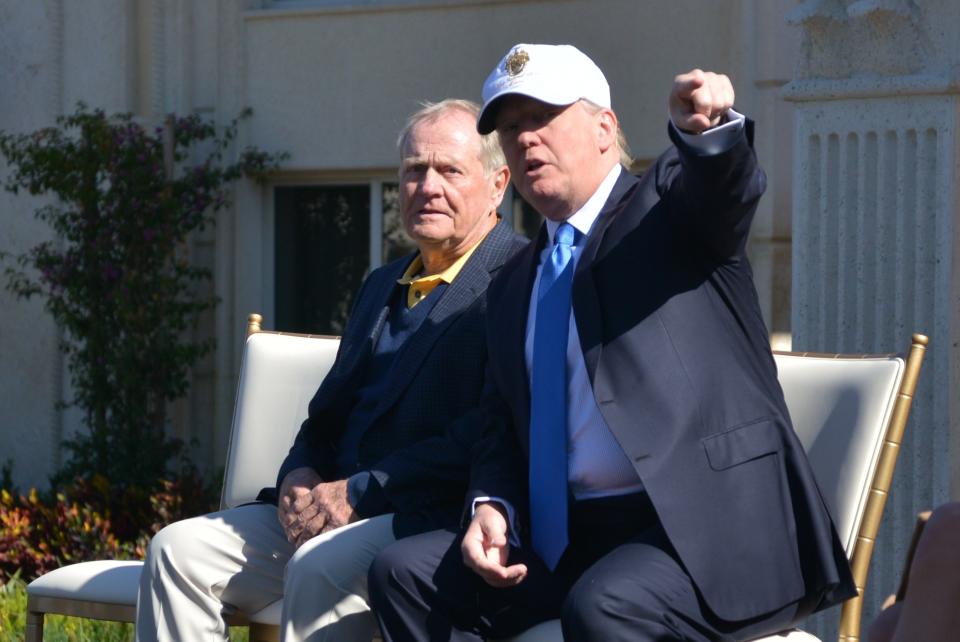Why are so many ex-athletes risking their legacies by endorsing Donald Trump this late in the election?

Why now?
Why have several generally beloved former sporting greats thrown their weight behind Donald Trump in these final days before the election?
Because there is a presidential election imminent, of course. But still, why in this moment? Why now?
Why did golf legend Jack Nicklaus do it on Wednesday, when the election was only six days away? Why did Hall of Famers Brett Favre, the star NFL quarterback, and Bobby Orr, the NHL icon, do so on Friday? Why did MLB Hall of Famer Mike Piazza and college football Hall of Famer Lou Holtz turn out for Trump events in Pennsylvania on Saturday, knowing full well that the campaign would publicize their presence?
Why did they do it when more than 75 million Americans had already voted early or by mail? When well over half of the 2016 presidential election’s turnout had already made their choice?
Nicklaus’s endorsement was unsurprising. He is a longtime friend of Trump’s, whom he supported in 2016 as well, and a business partner of sorts, designing one of Trump’s courses. He is, apparently, also the possible beneficiary of a $20 million in government funding for a mobile children’s hospital connected to the Nicklaus Children’s Hospital in Miami.
“This is not a personality contest; it’s about patriotism, policies and the people they impact,” Nicklaus wrote on his social media accounts. “His love for America and putting its country first, has come through loud and clear. …
“I know we are only a few days from Nov. 3 and Election Day, but I am certain many of you have not yet made up your minds. But if we want to continue to have the opportunity to pursue the American Dream, and not evolve into a Socialist America and have the government run your life, then I strongly recommend you consider Donald J. Trump for another 4 years. I certainly have and have already cast my vote for him!”

The next day, Nicklaus acknowledged that there would be backlash to his endorsement, while also questioning the casualty count of the COVID-19 pandemic and revealing that when he and his wife tested positive in March, he took hydroxychloroquine, a controversial treatment pushed by the president.
Former NFL quarterback Jay Cutler echoed Nicklaus’s endorsement on Instagram.
Favre was up next and tweeted that his “Vote is for what makes this country great. … My Vote is for @RealDonaldTrump.”
Orr endorsed Trump in a full-page ad in the New Hampshire Union Leader newspaper.
Finally, Holtz — who had also campaigned for Trump and has been promised a Presidential Medal of Freedom — and Piazza turned up in Pennsylvania for Trump events. At a rally, Trump lauded Piazza as “just a natural-born hitter … and a great catcher, by the way.” The former is undeniable and the latter, well, let’s not get bogged down in that.
The campaign strategy is obvious. Nicklaus retains many admirers among older Americans, who have swung hard toward Democratic nominee Joe Biden. Favre’s emotional clout in Wisconsin, where he spent most of his career with the Green Bay Packers, a state Trump carried by less than 23,000 votes in 2016, surely remains substantial. Piazza is a native of Pennsylvania, which Trump also won by less than a percentage point. The president is behind in the polls in both of these crucial swing states, same as in New Hampshire.
Trump has politicized sports like no other politician before him, starting culture wars with the NFL in the wake of Colin Kaepernick’s anthem-kneeling protest over policy brutality, the NBA over a litany of grievances, the U.S. women’s national soccer team for its own political stances and, well, any other sports entity he could tempt into a fight. At the same time, his supporters on TV — most famously FOX News’s Laura Ingraham in her “shut up and dribble” admonishment of LeBron James — have tisk-tisked athletes for not sticking to sports.
Now, Trump is trading on the names of those former greats (and Jay Cutler) who voluntarily attach their cultural capital to his cause.
But it’s unclear what, exactly, the former athletes are getting out of these late endorsements.
In an unusually steady election, marked by a far smaller margin of undecided voters at the late stages of the race than four years ago, the number of persuadable people is tiny, even in these swing states. While even sporting greats are, of course, free to hold and broadcast whatever political views they like, the upside to them poses questions.
For decades, many of America’s famous athletes used their platforms to advocate for their favored political causes until, in the 1990s and early 2000s, a new generation largely decided that engaging in politics was too costly to their endorsement income. And the reason athletes long shied away from political fights, until Kaepernick, James, Megan Rapinoe and so many others brought the tradition back, is that it might alienate as many as half of your fans.
While Nicklaus and Holtz had supported Trump for years, Favre and Piazza are very much of this apolitical generation of athletes and never leveraged their name like this before. And neither had Orr, for that matter.
This is the confounding part. For many months, FiveThirtyEight.com has listed Biden as either “favored” or “clearly favored” to win the election with, at the time of writing, an 89 percent chance of denying Trump a second term.
So why pick this moment to stain your apolitical sporting legacy with so many fans by publicly choosing sides? Why do it now, with the race already run?
There is no absolute certainty about who will win, but there is almost complete certainty that such endorsements won’t matter much anymore.
Leander Schaerlaeckens is a Yahoo Sports soccer columnist and a sports communication lecturer at Marist College. Follow him on Twitter @LeanderAlphabet.
More from Yahoo Sports:

 Yahoo Finance
Yahoo Finance 
